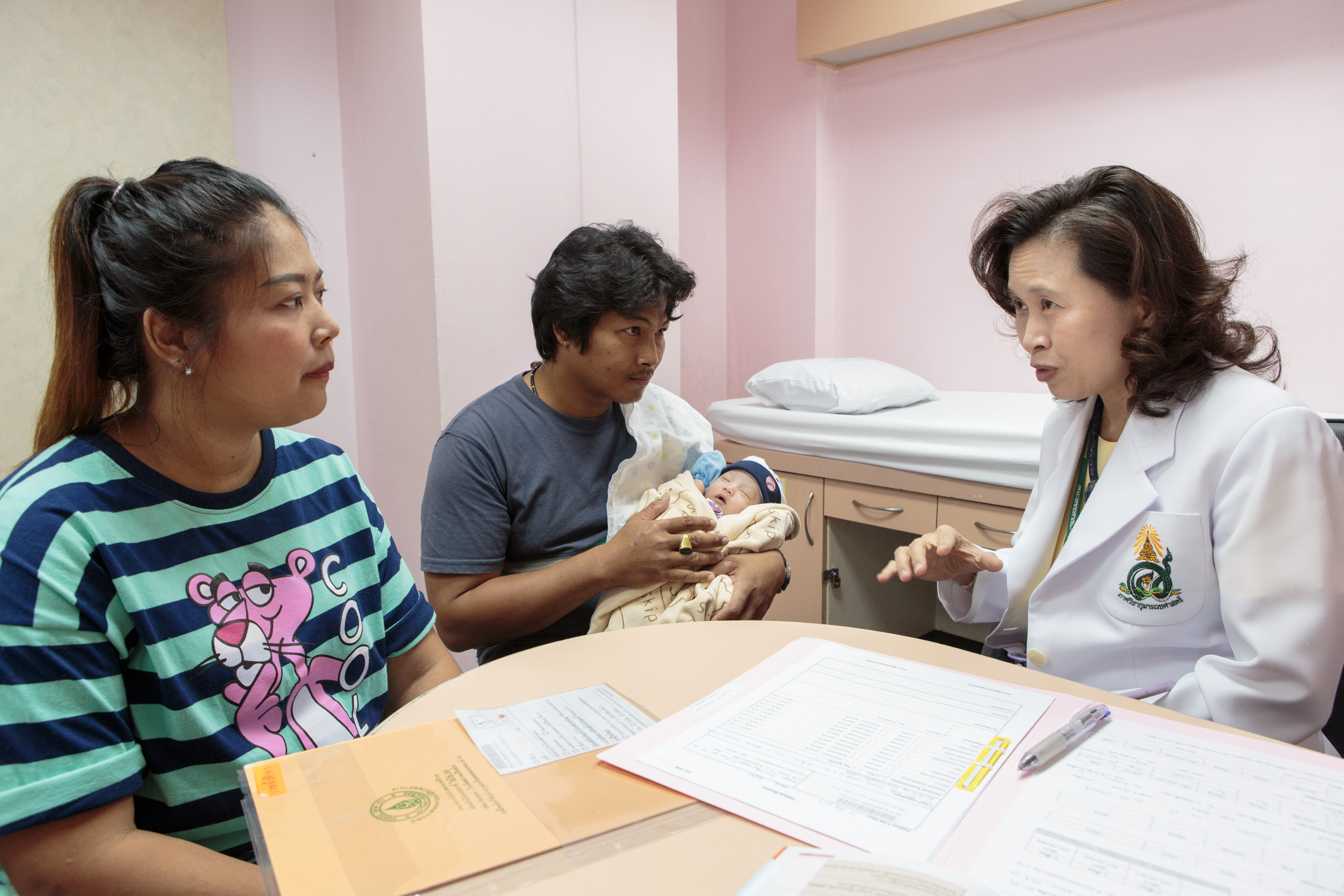Yupawan Siri can’t stop looking at her new baby. Sitting on the porch of her home in the Thai countryside, she cradles him and gazes into his little face. Her husband, Boonjun Kimklang is also smitten and reaches to stroke the baby’s smooth cheek. Just two-months-old, baby Thanakorn is peaceful and sleeping.
“Thanakorn is very healthy,” says Yupawan. “He was born in hospital at full-term, and was a healthy weight,” she says. “And, he’s had all of his vaccinations so far, including, of course, for hepatitis B.”
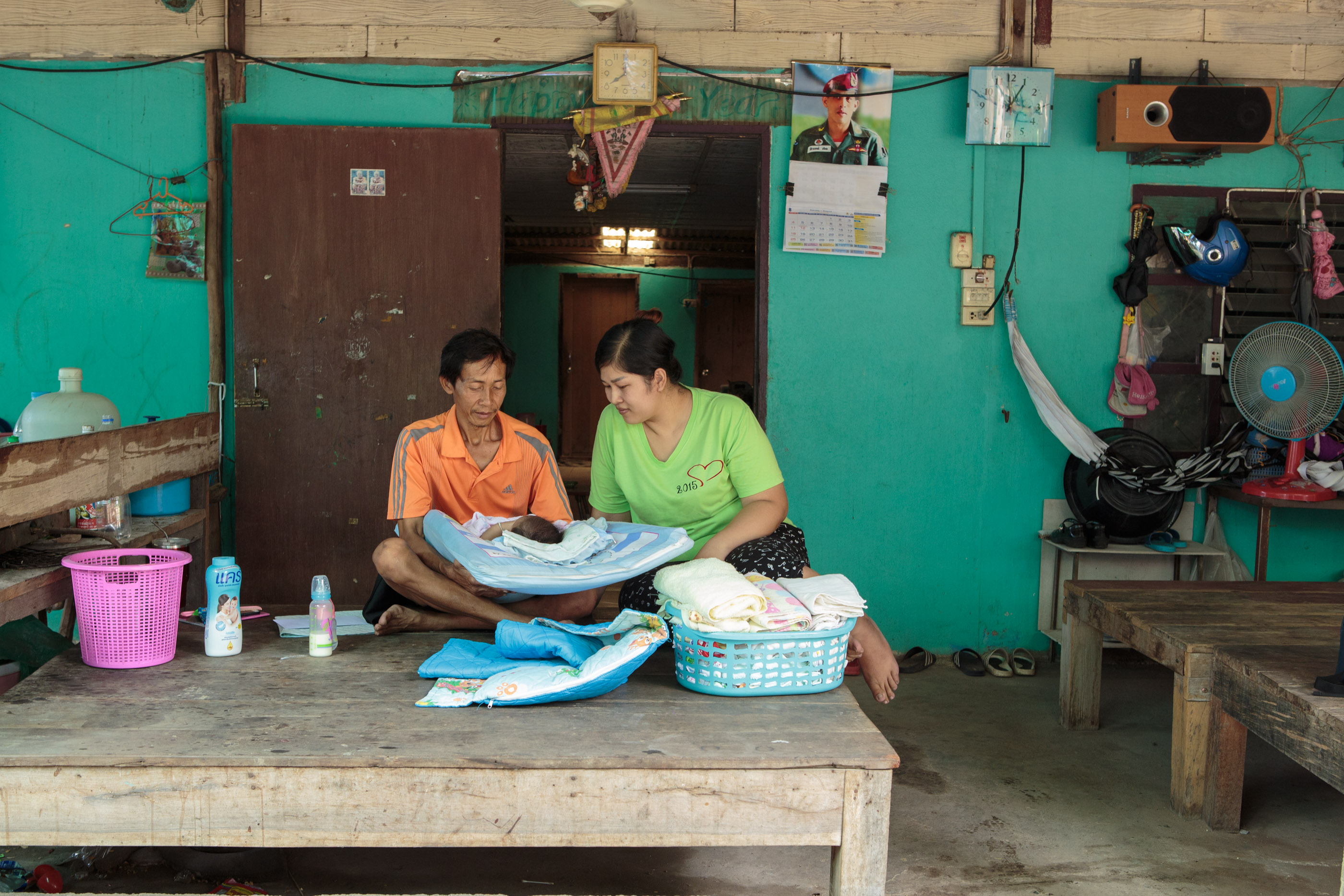
Yupawan and her husband Boonjun are smitten with their baby, Thanakorn. They live in Khaeng Koi district, a semi-rural area of Saraburi province about two hours north of Bangkok. (Photo credit: WHO SEARO / C. McNab)
In previous years, little Thanakorn would have been at high-risk of hepatitis B infection as his mother, Yupawan, is a hepatitis B carrier.
Hepatitis B is a viral disease spread through the blood – whether from mother to newborn, unsafe injections, or wounds. It can lead to immediate illness – but the most dangerous aspect of hepatitis B is the long-term damage it can do to the liver. A person may be chronically infected with hepatitis B for decades and find out only when it’s too late – once they have liver cirrhosis or cancer. An infected newborn has a 95% chance of developing a chronic infection.

Thanakorn is two months old and is up to date with his vaccinations, including a birth dose of hepatitis B vaccine. This is critical, as his mother Yupawan is a hepatitis B carrier. (Photo credit: WHO SEARO / C. McNab)
Globally, WHO estimates about 257 million people have a chronic hepatitis B infection. The resulting liver disease kills about 887,000 people every year. In the WHO South-East Asia Region, about 39 million people are chronically infected. Most people don’t know they have the virus.
Yupawan knew.
Yupawan is 28 years old and grew up in Saraburi Province, about two hours north of Bangkok. She works in one of the many manufacturing plants in the province, as a quality control specialist in a company that makes hard drives for computers. About nine years ago, she learned of her hepatitis B status when she was first pregnant, through pre-natal screening for hepatitis B at the local health centre.
“When I learned I had hepatitis B before my first child was born, I was so worried,” explains Yupawan. “But the doctor told me everything would be ok – that my baby would just need one extra dose of hepatitis B vaccine at birth, and he would be protected.”
Chronic hepatitis B infection is becoming increasingly rare in Thailand – a huge shift in a country where the viral infection used to be “hyper-endemic.”
Thai Research Gets Results
A study in 1986 estimated that about five million Thais – from 5 to 10% - were chronic hepatitis B carriers.1 Liver cancer – a common longer-term outcome of hepatitis B infection, was the most frequent cancer in men and third most common in women. Three of four babies born to mothers who were hepatitis B carriers were likely to be infected by three months of age. This perinatal transmission, from mother to newborn, was the most common route of transmission of the virus.
These grim statistics started to turn around just a few years later, when Thailand began to immunize all babies against hepatitis B, including a timely ‘birth dose’ for newborns.
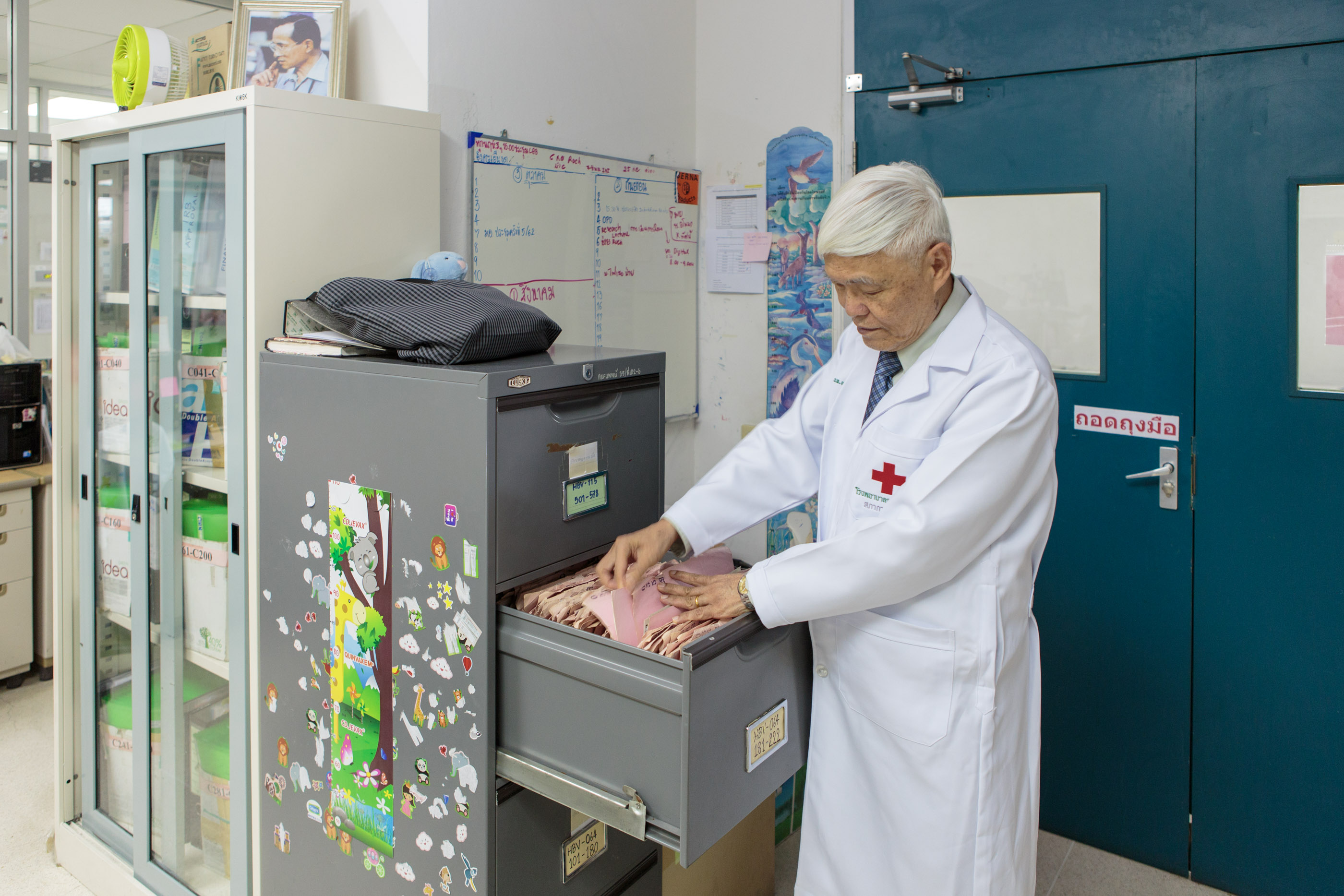
Professor Yong Poovarawan is a leading hepatitis B vaccine expert. Here, he shows files from decades of research that has shaped hepatitis B vaccine policy in Thailand and helped to inform global evidence. (Photo credit: WHO SEARO / C. McNab)
“We started with a pilot project in two provinces in 1988,” explains Professor Yong Poovarawan – a lead hepatitis B virologist in Thailand. “This expanded nationally in 1992. By 1999 we were vaccinating about 95% of newborns in this country. We’ve sustained that high coverage ever since.”
Dr Poovarawan is rightly pleased as he shows data from studies after 1992. His research led to a refinement of the hepatitis B vaccination schedule and included breakthrough long-term studies of vaccine efficacy for the same people over the course of twenty years. He also led research that demonstrated a sharp decline in hepatitis B infection amongst those who had been immunized.

Professor Yong Poovarawan’s research helped to demonstrate the importance of a hepatitis B birth dose. (Photo credit: WHO SEARO / C. McNab)
“In 1999 we showed that after the vaccine had been introduced universally in Thailand, just 0.7% of children were infected with hepatitis B, compared with 3.4% before vaccination.”2
This means that Thailand has controlled hepatitis B for many years. The World Health Organization defines control as recording one percent or less of children under five infected with the virus, demonstrated through a blood survey.
In 2014, the most recent blood survey in Thailand showed that fewer than one percent of people under twenty years of age were hepatitis B carriers – demonstrating that universal vaccination had been successful for at least twenty years. 3
On 26 July 2019, the WHO South-East Asia regional office verified Thailand’s achievement, together with that of Bangladesh, Bhutan and Nepal.
“Unwavering determination to reach every child, everywhere, every time, with life-saving hepatitis B vaccines through childhood immunisation, has made this achievement possible,” said Dr Poonam Khetrapal Singh, the WHO South-East Asia Regional Director.
Dr Singh went on to praise health workers for their efforts to reach every mother and child.
Health workers are the engine
Indeed, backed by the right policies, the vaccines and other tools they require, the health workers are on the front lines of hepatitis B control.

A nurse at Siriraj Hospital in Bangkok takes a blood sample from a pregnant woman. The blood will be screened for infectious disease including hepatitis B. Thailand has a rigorous screening program for pregnant women. (Photo credit: WHO SEARO / C. McNab)
In Thailand, one effective strategy is screening every pregnant woman for hepatitis B, whether they live in the countryside or the city.
At the Siriraj hospital in Bangkok – Thailand’s oldest and one of the largest – we’re shown the entire journey of controlling hepatitis B, from screening and counselling of pregnant women, to giving that all-important birth dose of hepatitis B vaccine, following up to ensure full vaccination of the child, and care for any mothers who may have hepatitis B.
In the paediatric ward, Professor Dr Kulkanya Chokephaibulkit presses a stethoscope to the tiny chest of Nattanitcha Thongaram as her father holds her. The little girl, now several weeks old, is doing very well. Her vital signs are all normal, she is feeding and gaining weight just as she should.
Professor Dr Chokephaibulkit talks with Aoithip and Akachai, after examining their baby Nattanitcha. Her mother, Aothip is a hepatitis B carrier but the baby will be completely protected from infection thanks to vaccination. She’ll receive her second hepatitis B vaccine dose today. (Photo credit: WHO SEARO / C. McNab)
Her mother, Aoithip Phiromnoy, wouldn’t expect any less. She trusts her doctor. Like Yupawan from north of Bangkok, Aoithip is also a hepatitis B carrier. They share the same experience of learning this during screening of their first pregnancy.
“When I first found out twelve years ago I was shocked,” says Aoithip. “I cried. I was so worried I would pass the virus onto the baby,” she continues. “But the doctor told me not to worry. The vaccine would protect the baby.”
And like her first child, Nattanitcha also received a birth dose of hepatitis B vaccine. She’s here at hospital today to receive her second dose. Three doses will give her full protection against hepatitis B for at least twenty years, and probably for life.
Professor Dr Chokephaibuilkit, an expert on pediatric infectious disease, talks with Aoithip’s husband, Akachai. She explains that his blood tests show he has no immunity against hepatitis B, and recommends he be vaccinated as well on the same day as his baby. Akachai agrees. “I’m not worried at all,” he says. “I trust the doctor’s advice.”
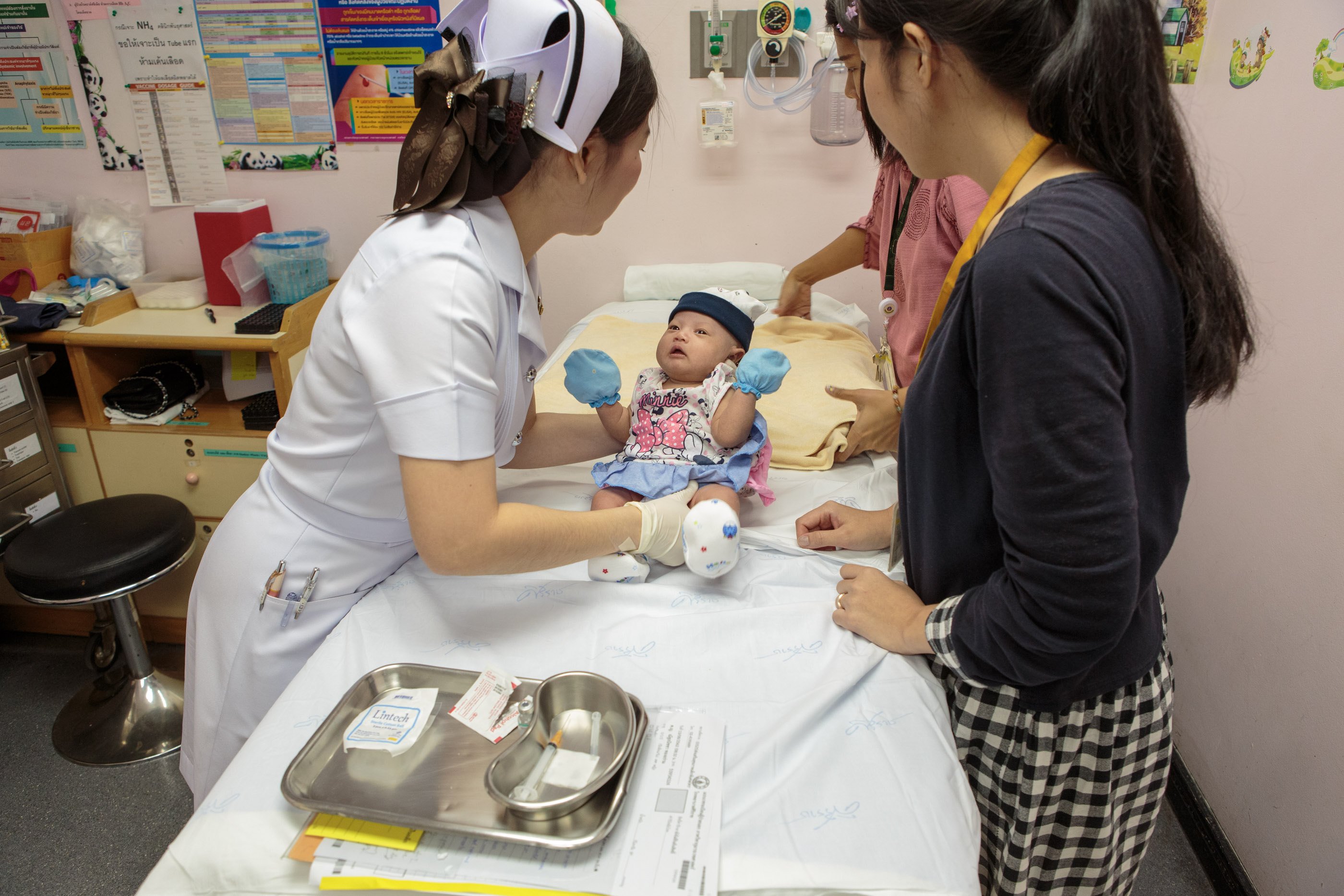
Baby Nattanitcha cries a little after receiving her second dose of hepatitis B vaccine, and she stops moments later as nurses swaddle her and pass her to father. (Photo credit: WHO SEARO / C. McNab)
And so baby Nattanitcha receives her vaccine. She cries with the prick of the needle, and then calms quickly as the nurses swaddle her in soft blankets.
It’s Akachai’s turn. He smiles through it all and moments later, is cradling his baby again.
Next: Elimination
Now that Thailand has controlled hepatitis B in children, the next step for the country, and other countries of the WHO South-East Asia Region, is to eliminate hepatitis B – a global goal for 2030.
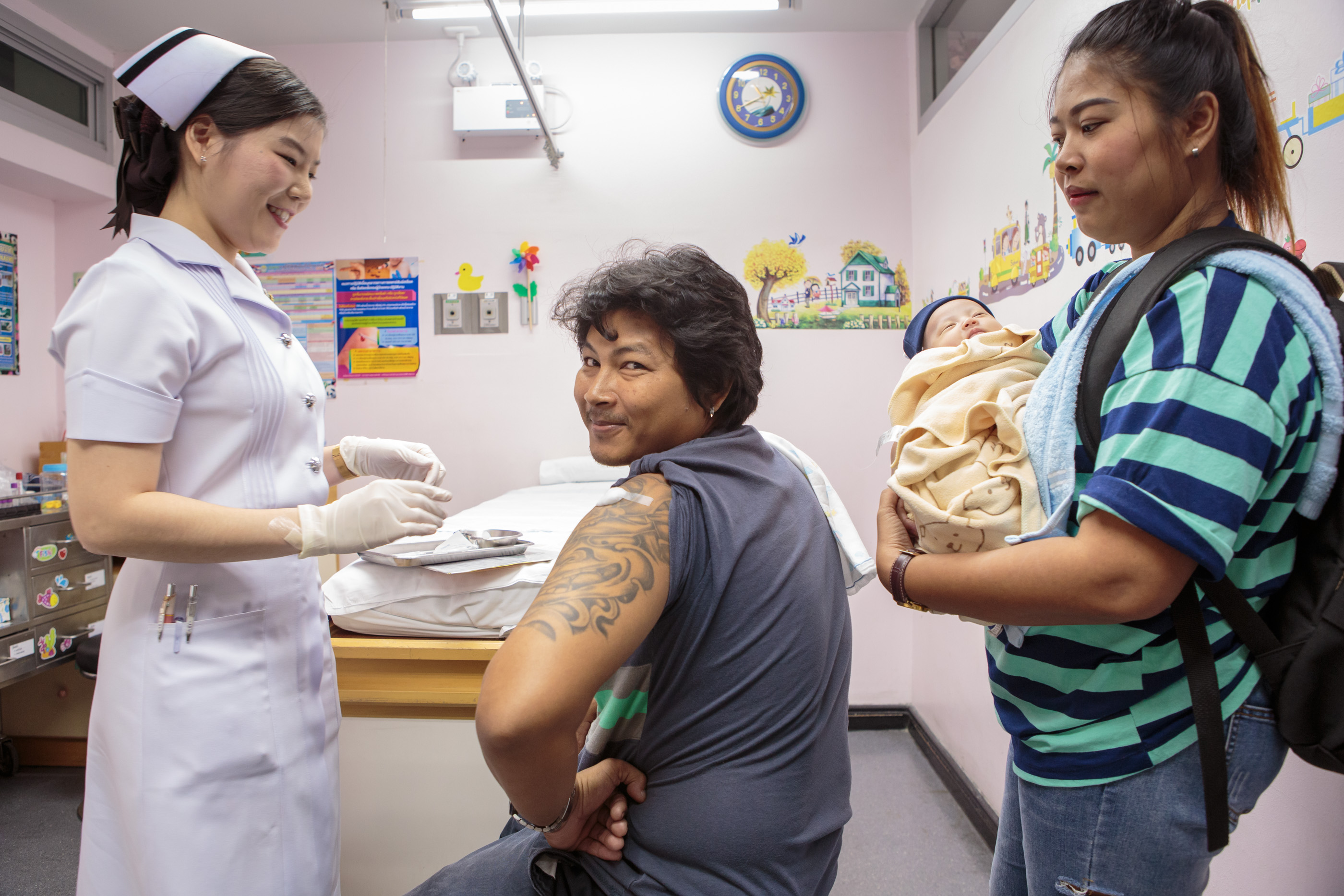
Akachai shortly after he is vaccinated for hepatitis B. He was born before the vaccine was offered universally in Thailand. Screening and then vaccinating him today will help to ensure he is never infected. (Photo credit: WHO SEARO / C. McNab)
Vaccination with three or more doses is the best way to prevent the disease. But other measures, including ensuring blood safety and providing safe injections for drug users is also important. Another elimination strategy is universal testing of adults who may be at risk – rapid diagnostic tests are now inexpensive and can be administered almost anywhere. Hepatitis B can also be treated with affordable antivirals that stop the virus from replicating in the blood. Some countries are starting to take these measures. India, for example, has announced plans to mass test and treat both hepatitis B and C.
Thanakorn
Still sleeping on the front porch in leafy Khaeng Koi district north of Thailand, baby Thanakorn may be dreaming. As it begins to rain, his dad, Boonjun, jumps up to pick clothes off the line – a dozen pastel bibs and sleepers, all lovingly washed by Thanakorn’s mother, Yupawan.
He won’t remember the nurses who were there for him just after he was born, the concerns about Hepatitis B, or the prick of the vaccine needle providing that all-important birth dose. He’ll simply grow, learn to crawl, then to walk and talk, ride a bike, and play with his friends.
When asked what she’d like Thanakorn to do when he’s older, Yupawan replies: “anything he wants.”
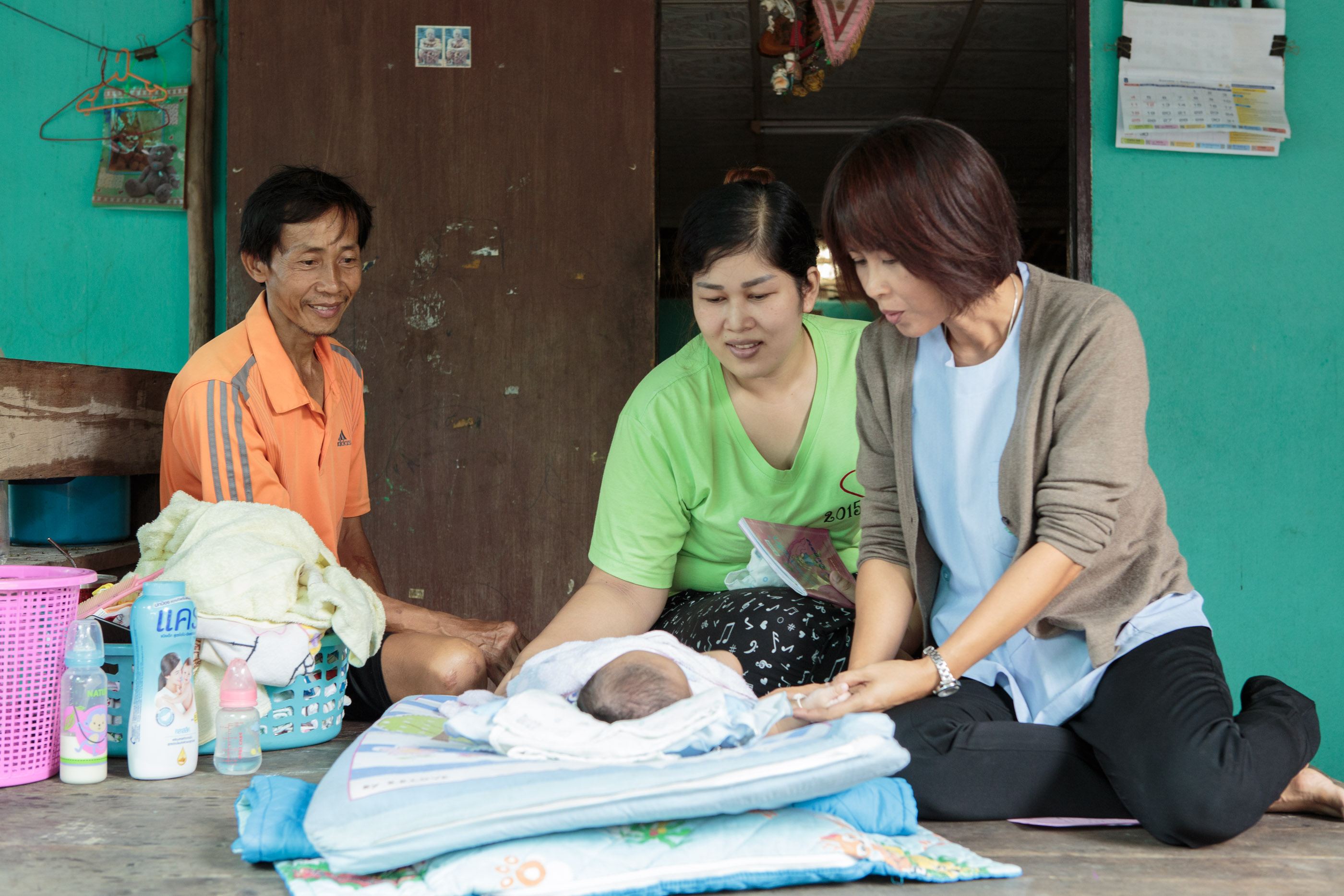
Boonjun (in orange), Yupawan (green) and their baby Thanakorn, together with Jumnian Leusak, the nurse who will give Thanakorn his future vaccinations as per Thailand’s immunization schedule. (Photo credit: WHO SEARO / C. McNab)
[1] Pramoolsinsap C C, Pukrittayakamee S S, Desakorn V V. Hepatitis B problem in Thailand. Southeast Asian J Trop Med Public Health. Asian J Trop Med Public Health. 1986 Jun;17(2):219-28
[2] Poovorawan Y, Theamboonlers A, Vimolket T, Sinlaparatsamee S, Chaiear K, Siraprapasiri T, et al. Impact of hepatitis B immunisation as part of the EPI. Vaccine. 2000;19(7–8): 943–949.
[3] Posuwan N, Wanlapakorn N, Sa-nguanmoo P, Wasitthankasem R, et al. The Success of a Universal Hepatitis B Immunization Program as Part of Thailand’s EPI after 22 Years’ Implementation.
PLoSPLoS One One. 2016; 11(3): e0150499





